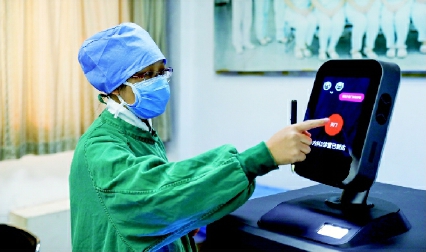Shougang News

OrionStar Robots Join Battle against COVID-19 with Investment from the Shougang Fund
Release Time:2020-04-22 16:27:00

"Where can I register?", "What should I do if I have fever?". In the outpatient hall of Peking University Shougang Hospital, a robot about half the height of a man is hard at work.
Intelligent robot "warriors" join the battle against the new coronavirus epidemic, effectively reducing the risk of infection in hospitals. On January 27, Peking University Shougang Hospital, which was under great pressure, received support in the form of the first batch of of two robots donated by OrionStar, a company which has received investment from the Shougang Fund. The first is an intelligent service robot, capable of serving as an unmanned hospital guide, automatically responding to fever inquiries, guiding patients and conducting preliminary diagnosis and treatment, as well as enabling doctors to conduct remote diagnosis and treatment of patients. The second is an intelligent delivery robot, composed of autonomous navigation modules and transport boxes. It can deliver test result documentation and drugs according to the needs of the hospital. Helping to completing simple but laborious and repetitively repetitive work in the medical care process, the robot can reduce the workload of medical staff. On January 31, OrionStar also completed delivery of medical service robots being donated to Wuhan Huoshenshan Hospital, an event that attracted attention and news coverage across the world. These robots were put to use in epidemic prevention and control on the frontline.
At present, OrionStar's intelligent epidemic prevention and control robots are also used in a number of other hospitals, including Beijing Haidian Hospital and Zhengzhou Qiboshan Hospital.
In order to secure victory in the epidemic prevention and control battle, OrionStar was quick to invest in research and development, launching the robot medical system epidemic prevention and control program. At present, it has produced three types of intelligent epidemic prevention and control robots to join the fight against COVID-19. OrionStar’s intelligent epidemic prevention and control robot is designed with “non-contact processing” as its core principle. It allows doctors to remotely inspect a patient’s condition visually via video, as well as take a patient’s body temperature, check their tongue coating, and interact with the patient verbally. The robots can collect data corresponding to each personal face ID and transmit video and pictures to patients, which may be used to respond to patients’ questions, or transmit virus prevention and control related knowledge. At the same time, patients can also directly contact medical staff through video when necessary.
GreetBot, the intelligent epidemic prevention and control robot, is based on the only full-chain AI technology developed by OrionStar. Its functions include natural voice communication, automatic face recognition, navigation and guidance. Used in the medical care environment, it can provide fever pre-diagnosis, isolation consultation, face recognition, remote patrolling of wards, hospital navigation, data collection and other medical services. It can also provide patients with basic information including where to register, where to collect test results and how long to wait for test results, what to do if they have fever, and so on. If the patient has a fever, they can receive a remote diagnosis from a doctor via the robot, thus minimizing the contact between medical staff and patients, and reducing the risk of cross infection.
Copyright © 2003 shougang.com.cn, All Rights Reserved